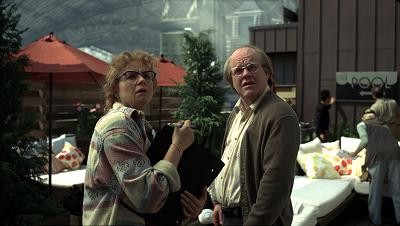
Danny Boyle is a special talent behind the camera. He has created the greatest drug movie of all time (Trainspotting) the second best horror film of this decade (28 Days Later) and one of the better, albeit still heavily flawed, modern sci-fi films (Sunshine). His latest movie, Slumdog Millionaire, has been riding a wave of festival buzz and Oscar talk (and it will most certainly receive that "little movie that could" nomination that went to both Juno and Little Miss Sunshine), and I was really excited to see it. Slumdog tells the story of Jamal, a Mumbai street kid who grows up to get on the Indian version of "Who Wants to Be a Millionaire." Nobody believes that he could actually know the answers, so, after his first night on the show, which takes him all the way up to the final question, the police take him in and interrogate him to discover his method of cheating. He begins to tell them his life story, relating each question to specific events from his orphan youth. After the death of their mother in a religious riot, Jamal and his brother Salim meet up with a girl named Latika and eventually wind up in an absurdly corrupt orphanage. After escape and separation, Jamal spends the rest of his life trying to find Latika, while Salim transforms in a way frighteningly reminiscent of Lil' Ze from City of God. Of course Jamal's story wins the cops over, and he goes back on the show to try to find Latika again. It ends relatively happily and there's a dance number over the credits as some sort of homage to traditional Bollywood.
I can say that it ends happily because you know going in exactly what will happen. Like all inspirational films, you know that the character will reach their true goal in the end. In fact, after ten minutes, you should be able to guess the final question. I can't criticize the film for that. Unfortunately, I can criticize it for a few other things. Boyle's camera tries to capture the energy behind modern India (essentially the opposite of Wes Anderson's superior The Darjeeling Limited). This works perfectly about half the time. The color scheme is beautiful, and there are some truly stunning shots (a sequence involving young Jamal and Salim on a train stand out the most in my mind), but the constant motion does get annoying (although not quite at the level of a certain recent blockbuster). It also feels like nearly half the film is shot at either an odd angle or in slow motion, two techniques that rarely work here. Some of the music choices were also rather questionable. I would have much preferred them to just use Indian music all the way through, but one or two of the western songs actually work rather well (the use of M.I.A's "Paper Planes" perfectly complements the aforementioned train sequence, but the use of a remix about five minutes later fails). The rest of the western and techno music feels overbearing and takes away from the intended feel of the scene. The performances from the actors playing the three leads (and each had to be played by three actors at three separate ages) were very good, but some of the supporting performances completely fail, especially those playing the gangster characters.
 Their "Millionaire" set really does look exactly like ours
Their "Millionaire" set really does look exactly like oursDespite all of this, I still must recomend the film. It may not deserve the Oscar talk, but it's still something fun and different. The story is heart warming and occasionally pretty funny, the actors are great and, for the most part, it looks wonderful. It also has some good, albeit somewhat basic, Indian class commentary. Its always nice to see a great director take a bunch of relative unknowns (Anil Kapoor, who plays the gameshow host, is the only really well-known actor in the film, but even that is just in India), and make a good film out of it. I was also fascinated by the aspect of Boyle taking this very American story, moving it to India, and then basing it entirely around what was originally a British television show. It's something that could only be done in this modern world.
Rating (out of ****): ***
Edit: You know what, its been about a month since I saw the film. Upon much further review and a rewatch, I've decided that I gave it far too much credit. The acting is bad, the story is not as fun as I originally gave it credit for, the end is unbearable and, while the structure is interesting, it limits any opportunity to get to know the other characters.
New Rating (out of ****): **


 Craig and
Craig and 



